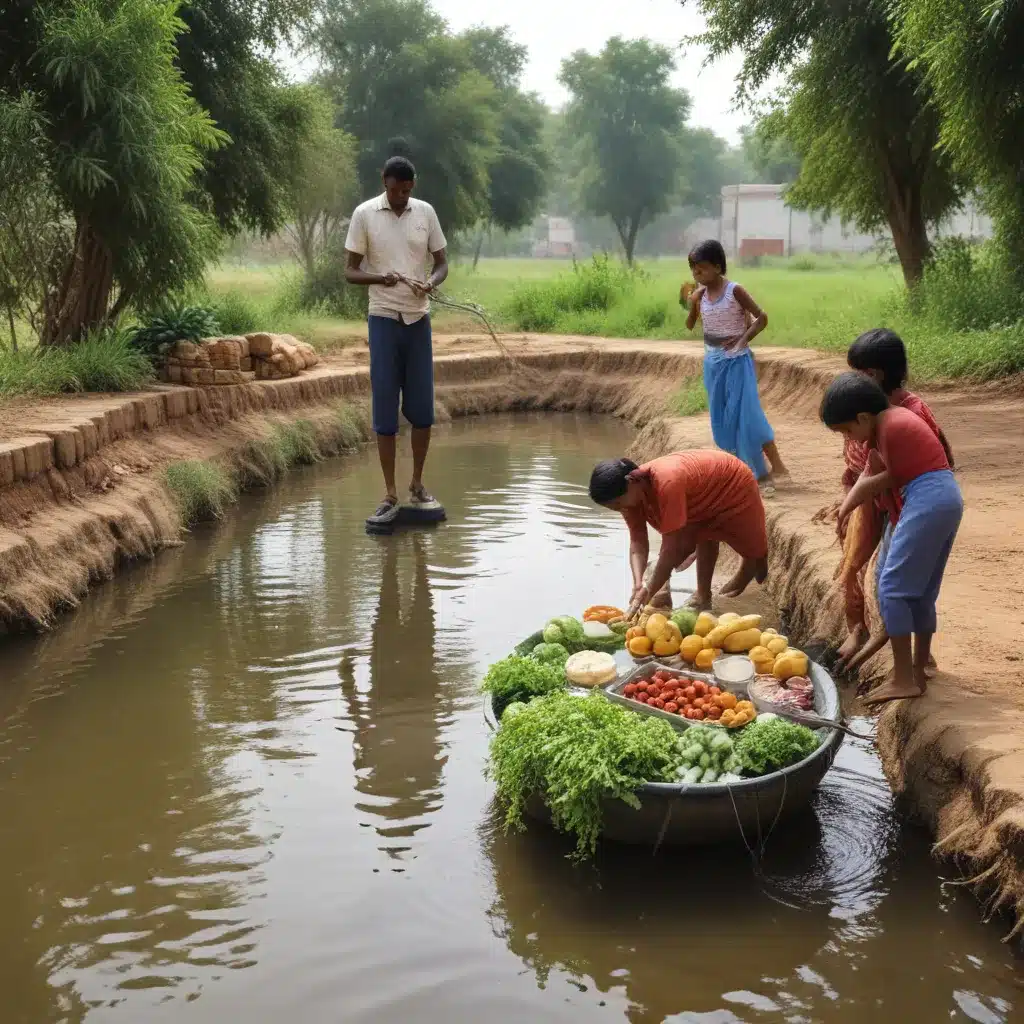
Harnessing the Interconnected Challenges of Water, Energy, and Food
In the rapidly urbanizing landscape of Hyderabad, India, a quiet revolution is underway – one that seeks to redefine the way we approach the fundamental elements that sustain our existence: water, energy, and food. As a seasoned expert in this field, I’m excited to share the innovative strides being made in Hyderabad to address the complex and often overlapping challenges within this vital nexus.
Integrated Approaches for a Sustainable Future
The water-energy-food (WEF) nexus is a framework that recognizes the interdependencies between these three critical resources. Decisions or actions taken in one domain can have significant impacts on the others, often leading to unintended consequences. Hyderabad’s pioneering researchers and community leaders have embraced this holistic approach, developing integrated solutions that tackle multiple challenges simultaneously.
Harnessing Solar Power for Water Purification
One such innovation is the groundbreaking work being done at the Indian Institute of Technology (IIT) Hyderabad. Led by Associate Professor Dr. Praveen Meduri, the research team has made remarkable advancements in the field of photo/electrochemical water splitting – a process that uses solar energy to produce clean hydrogen and oxygen from water.
“Our goal is to create efficient and cost-effective catalysts that can harness the power of the sun to not only generate clean hydrogen fuel, but also purify contaminated water sources,” explains Dr. Meduri. “By tackling both the energy and water challenges in one integrated solution, we’re working towards a more sustainable future.”
The team’s research focuses on developing advanced functional materials that can perform multiple tasks, such as catalysis, energy storage, and environmental remediation. This multi-functional approach allows for the optimization of critical processes, ultimately enhancing the efficiency and scalability of their water purification and renewable energy systems.
Closing the Loop: Nutrient Recycling for Sustainable Agriculture
Another key initiative in Hyderabad is the CGIAR’s work on the water-energy-food nexus, which aims to address the interconnected challenges of food security, sustainable agriculture, and environmental conservation.
“The CGIAR’s research in Hyderabad is focused on developing innovative solutions that close the loop between water, energy, and food production,” says Dr. Ismahane Elouafi, the Director-General of the CGIAR System Organization. “By integrating practices like nutrient recycling, precision agriculture, and renewable energy, we’re helping to create a more resilient and sustainable food system for the region.”
One such example is the CGIAR’s work on nitrogen-fixing technologies. The Nitrogen Reduction Reaction (NRR) is essential for sustainable ammonia production, a vital input for agriculture. However, this process faces significant energy barriers. The IIT Hyderabad team, led by Dr. Meduri, is dedicated to developing selective and efficient catalysts to overcome these challenges, paving the way for more sustainable fertilizer production.
“By unlocking the secrets of the NRR, we can reduce the energy-intensive and environmentally damaging methods currently used to produce ammonia,” explains Dr. Meduri. “This, in turn, will support the development of climate-smart agriculture practices that are better aligned with the principles of the water-energy-food nexus.”
Community Engagement and Advocacy for Inclusive Solutions
Hyderabad’s water-energy-food nexus innovations extend beyond the laboratory, as the city’s community leaders and policymakers work to ensure that these advancements benefit all citizens. Through collaborative efforts and inclusive engagement, they are driving sustainable change at the grassroots level.
Empowering Marginalized Communities
One such initiative is the Joint Action for Water (JAW) program, which focuses on improving access to clean water and sanitation services in underserved communities. By working closely with local organizations and community members, JAW has been able to identify and address the unique challenges faced by these groups.
“In many parts of Hyderabad, access to clean water and basic sanitation facilities remains a significant challenge, particularly for marginalized communities,” says JAW’s community outreach coordinator. “Through our collaborative approach, we’re not only installing infrastructure, but also empowering residents to become active stakeholders in the decision-making process.”
This inclusive model has led to the development of community-driven water management systems, as well as the implementation of educational programs that promote water conservation and hygiene practices. By prioritizing the needs and perspectives of the most vulnerable populations, Hyderabad’s water-energy-food nexus innovations are ensuring that no one is left behind.
Advocating for Sustainable Policies
Alongside grassroots initiatives, Hyderabad’s experts are also actively engaging with policymakers to drive systemic change. By leveraging their technical expertise and research insights, they are advocating for the adoption of integrated, sustainable policies that address the water-energy-food nexus.
“One of the key focus areas of our advocacy work is promoting the circular economy model, where the waste and by-products of one process become the input for another,” explains Dr. Elouafi. “This approach not only reduces resource consumption and environmental impact but also creates new economic opportunities for the community.”
The CGIAR, in partnership with local government agencies and civil society organizations, has been at the forefront of these advocacy efforts. Through policy briefs, multi-stakeholder dialogues, and strategic partnerships, they are working to ensure that Hyderabad’s water-energy-food nexus innovations are supported by enabling policies and funding mechanisms.
Towards a More Resilient and Sustainable Future
As Hyderabad continues to grapple with the challenges of rapid urbanization and climate change, the city’s water-energy-food nexus innovations offer a glimmer of hope. By embracing an integrated, collaborative, and community-centered approach, Hyderabad is paving the way for a more resilient and sustainable future – one that balances the needs of people, the planet, and prosperity.
Through the groundbreaking work of researchers, community leaders, and policymakers, Hyderabad is demonstrating that solutions to the water-energy-food nexus can be found when we think holistically and work together. As we look to the future, the lessons learned in Hyderabad can provide valuable insights for communities around the world, inspiring them to follow suit and unlock the transformative potential of the water-energy-food nexus.
To learn more about Hyderabad’s water-energy-food nexus innovations and how you can get involved, visit the Joint Action for Water website. Together, we can create a more sustainable and equitable world for all.

